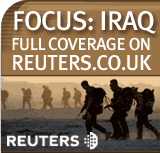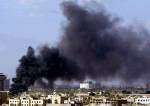|
|
 |
 |
 |
 |
 |
 |
 |
 |
22 Mar 2003 16:33
GMT |
 |
 |
 |
 |
 |
More raids
rock Baghdad
By Nadim Ladki
BAGHDAD (Reuters) - Fresh explosions have rocked the Iraqi
capital Baghdad as a succession of raids send black smoke billowing
over parts of the city shaken by a fierce overnight blitz.
At dusk, a wave of new attacks shook the city outskirts
with what witnesses described as a continuous explosions. New fires
lit up the south and east, and tracer fire sliced through the night
sky.
"They are definitely raising the intensity now," Reuters
correspondent Khaled Yacoub Oweis said.
Iraqi ministers said three people had been killed and 207
wounded in the overnight attack, which was much heavier than on the
first night of the U.S.-led war to oust Iraqi President Saddam
Hussein.
The city's air raid sirens gave little or no warning of
the daylight attacks on Saturday. There was little sign of Iraqi
anti-aircraft fire, which had been intense during the overnight U.S.
air and missile strikes on the centre of the city.
Iraqi Health Minister Umeed Midhat Mubarak said three
people had been killed in the city overnight.
"Three people were martyred in Baghdad last night and we
are preparing for more deaths because the situation is developing
rapidly," he told a news conference.
Information Minister Mohammed Saeed al-Sahaf earlier told
reporters that 207 civilians had been wounded overnight, making a
total of 250 since raids started on Thursday.
Iraqi forces moved on Saturday to set oil-filled trenches
ablaze around the city in an apparent bid to create a smokescreen to
hinder air strikes by U.S. and British forces.
At least two dozen fires were raging around Baghdad,
sending walls of thick black smoke into the sky. But the strategy
might not prove effective attacks because many modern weapons use
satellites to navigate.
FIREBALLS AND MUSHROOM CLOUDS
The overnight raids sent huge fireballs and mushroom
clouds of smoke and debris into the night sky. They targeted
Saddam's main palace on the banks of the River Tigris, government
and military targets and other symbols of his rule.
Dazed parents said their children trembled with fear at
the onslaught on the sprawling, palm-dotted city, which is home to
over five million people.
Reuters correspondent Samia Nakhoul reported two
explosions in central Baghdad as dawn was breaking. Less than an
hour later, a third blast echoed from the city's outskirts. Air raid
sirens wailed and ambulances raced through the streets.
In the first afternoon attack, a series of explosions
started on the outskirts accompanied by the overhead rumble of
warplanes, and gradually moved towards the centre of the city.
Air raid sirens sounded after the attacks, rather than
before, and no anti-aircraft fire could be heard in the city centre.
At dusk, more large blasts were heard pounding on
Baghdad's outskirts and new fires lit the darkening skies over the
south and east of the city.
On the ground, small groups of soldiers with rifles were
out on the largely deserted streets.
Shrapnel and glass littered the riverside Abu Nuwas
Street, across the Tigris from Saddam's presidential compound.
In the compound, which houses the headquarters of Qusay,
the younger son charged by Saddam with defending Baghdad, a building
still smouldered. A small villa belonging to Vice President Taha
Yassin Ramadan was destroyed.
Two other buildings, the Palace of Peace and the Palace of
Flowers, were struck and fire engines were seen at the gates of the
Jumhouriya (Republic) Presidential Palace, next to broken water
pipes and other debris.
An air force centre in Saadoun Street in central Baghdad
was also hit by repeated cruise missile strikes, while front of a
ministry building close to the Rasheed Hotel was shattered.
Shaken residents said despite the terrifying fury of the
attacks they would not take to the air raid shelters scattered
around the city. Memories of an attack which killed hundreds of
people in a shelter in the 1991 Gulf War still linger.
"We'd prefer to die at home than suffocate underground in
a shelter," said Suad Saleh. "I won't go to the shelters".
|
|
 |
|



